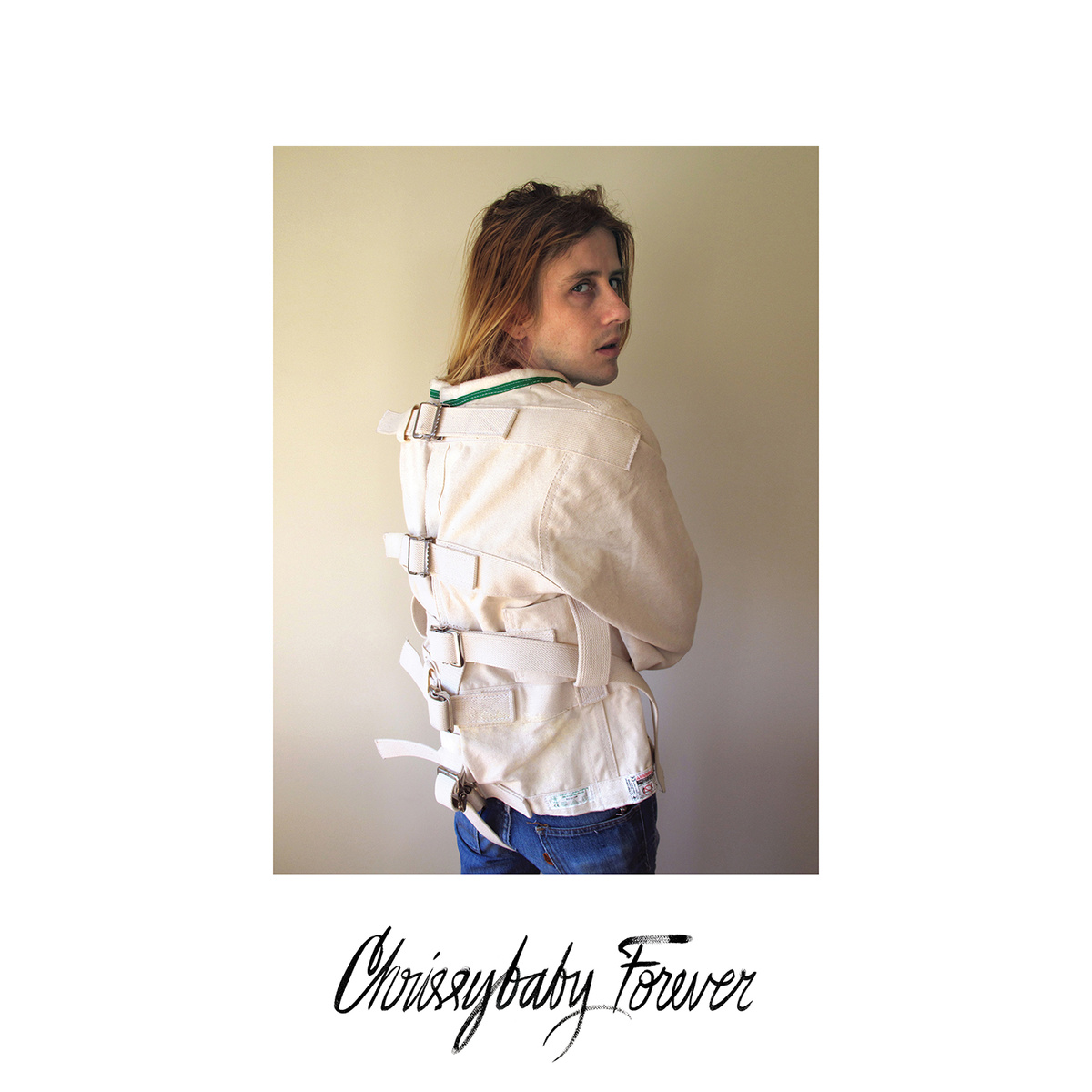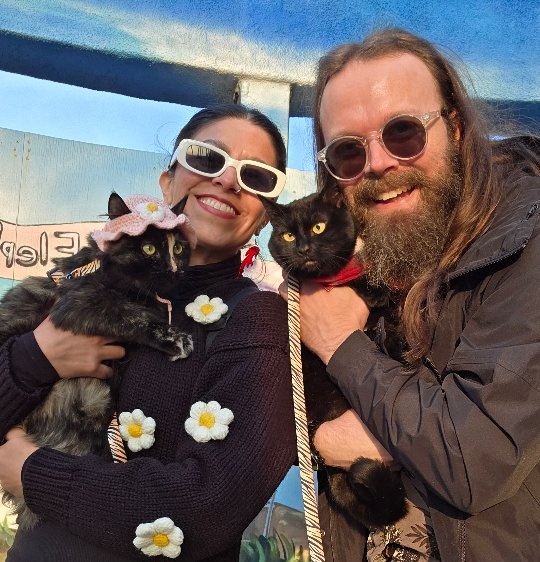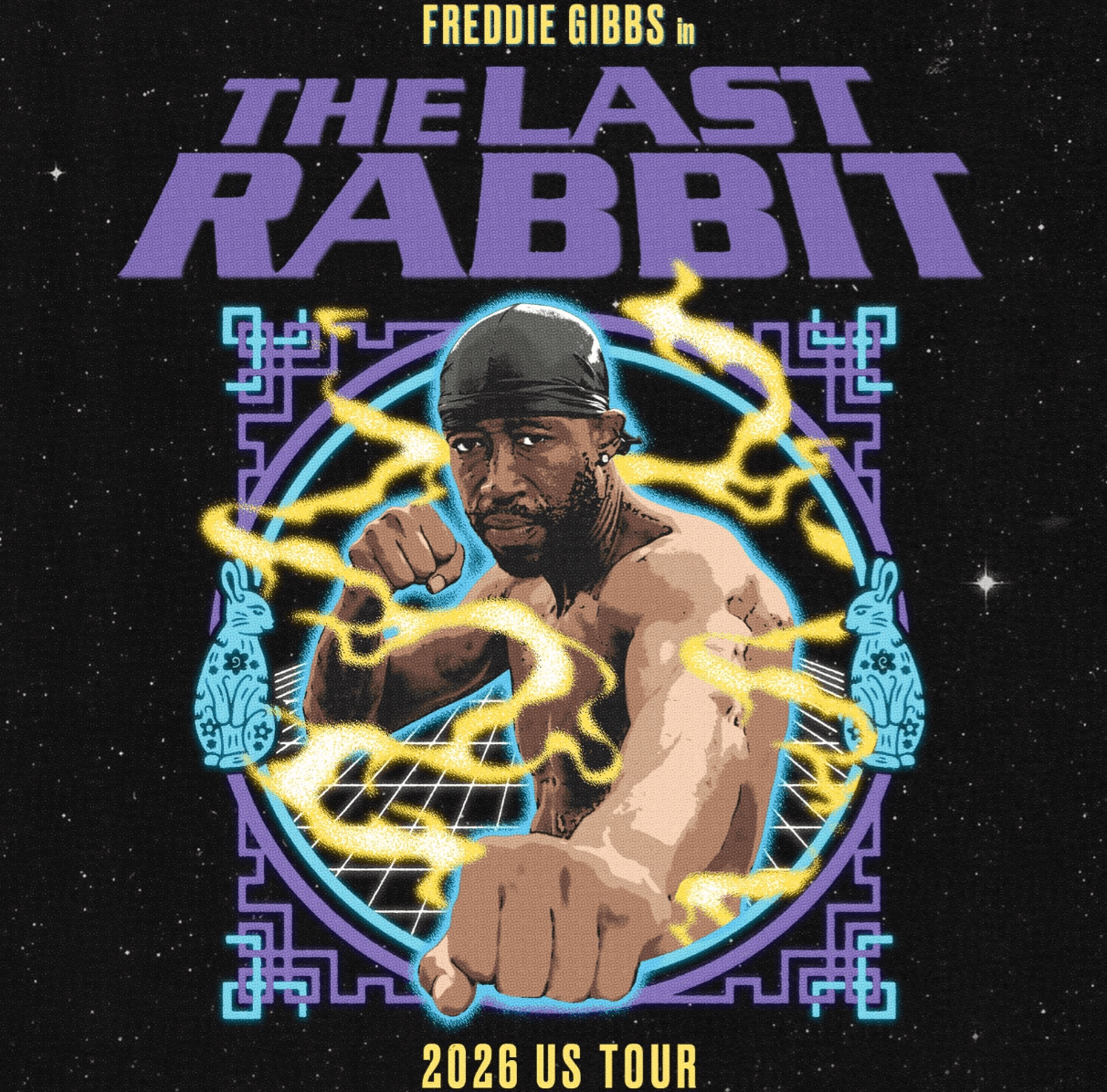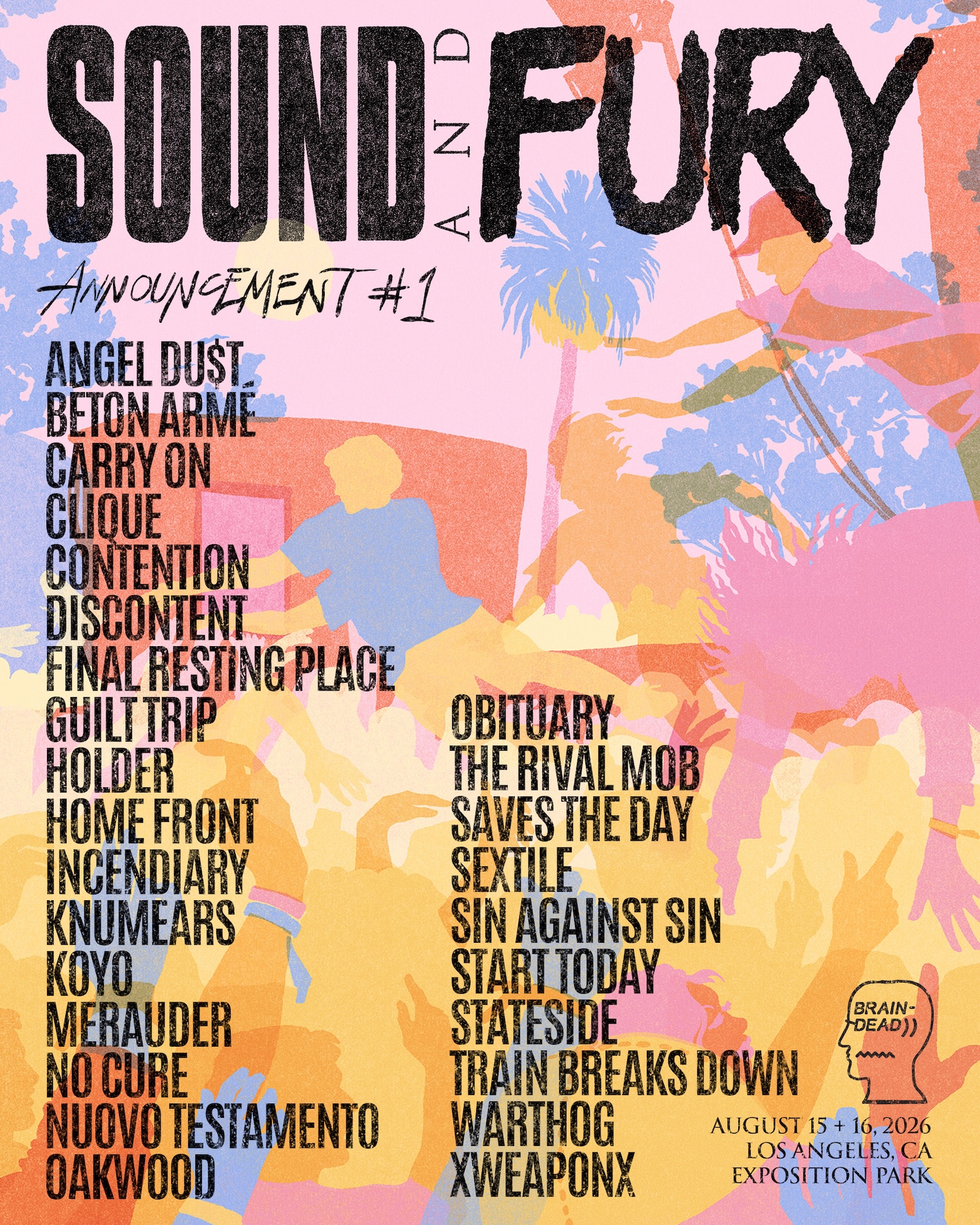Last week, Christopher Owens released the song "Selfish Feelings" along with unexpected news about a new solo album, Chrissybaby Forever. For those who've been following Owens' career, it represents a scrappy return to form. Recorded in San Francisco with engineer J.J. Wiesler, Chrissybaby is arguably the most Girls-ish thing Owens has released since that band evaporated in 2012. It's also the kind of record that most fans seem to want from Owens: jangly, heart-on-your-sleeve pop missives about being in love and fucking up and just trying your best. (Album opener "Another Loser Fuckup" could be a slightly grown-up spiritual cousin to Girls' "Lust For Life.") Even though it's been less than a year since the release of his last album, A New Testament, Owens credits an overabundance of free time and a health-driven need to keep busy as reasons for the new record's quick birth. But there were more pragmatic factors at play, too. Having toured his previous two albums supported by a large (and expensive) backing band, Owens gets from the new record an opportunity to present himself in a way similar to his earliest days as a musician, both aesthetically and thematically. "I think this is just my fundamental view on life," says Owens of the new record's subject matter. "It's a struggle to get though the days, but you find ways. There are friends, and there's happiness, and there's small rewards here and there ... and that's what you have to cling to." We talked about the new record -- which you can stream below -- and everything else in Owens' life.
STEREOGUM: I've been listening to your new record all day with my windows open and the sun coming into my office. It's kind of the perfect soundtrack for the beginning of summer: sunny and optimistic and very loose.
OWENS: Thank you. To be perfectly honest with you, there used to be no question in my mind that if I like what I'm doing then others will just naturally also like it. The past two records for me have been a chance to see that's not always true. People will sometimes say, "Sure enough they're good songs, but it's not really my thing," and not get into it. Making this record I had that on my mind. I was prepared for people maybe not to like it. But thank you. I'm glad you like it.
STEREOGUM: It's hard when you really love something, and then for other people not to love it, or to just not get it in a way that you wish they did. It's also nice to have in your mind that it doesn't really matter.
OWENS: There was never a huge global reception to Girls or anything else I've done, but there was a very strong core of fans, and I've always hoped that at least those people would stay. I see them when I tour and it's wonderful. It really makes me feel happy, and they say the same genuine, touching things that only, I guess, teenagers and lonely people will say to you, and it makes you feel very good. When you're at home checking your Twitter and reading sophisticated reviews, it can be quite daunting to see people that have supported you from day one suddenly start to just write you off.
STEREOGUM: Did you feel like some people were thrown by A New Testament? What was your experience of playing that record?
OWENS: Playing it live was one of the best experiences I've had playing live, period. I had the ideal band. I had people that have recorded with me since the Girls records that never would tour because they were too fragile, or too fancy, or too expensive. For whatever reason, they were like, "Yeah, I'll tour with you on this record." It was such a pleasure. It was such a warm feeling to even be able to play some of those old songs from Father, Son, Holy Ghost for the first time live with those guys. It was something. Those are the types of memories you try to stock up on in life.
I had a fantastic time, but the reality is that I didn't sell out shows. I had a huge band, and just the organ alone was a beast to travel with. It had this huge Leslie speaker that weighs something like 300 pounds. It's a giant cost -- flying all those people around, the hotels. The reality was I lost money, and I lost money on the first album as well because I had a big band then, too. Also, I didn't want to play festivals with that gentle music, so I turned down festivals and I lost money on the last two albums.
There was a bit of a reality check at the end of the year when touring was over. It could not continue in the same way; it wasn't sustainable. Luckily for me, that was up my sleeve all along. From day one I said: I want to record a debut album, and then I want to record my country album, and then I'm going to go do an album by myself -- like a punk album, sort of the other side of the coin. I think A New Testament touched on things that were similar to Girls and the Father, Son, Holy Ghost period. What I wanted to touch on with this record was more in keeping with the Girls albums -- the beginning, the root stuff. The stuff I played by myself.
The album was made with me and my best friend: just a musician and engineer producing. There are limitations, and those can be good things. My solos aren't going to be as fancy, but they're going to sound like me. Those were things I wanted to try again. Luckily that idea came at the right time, because the model I've been doing with the past two records was just not sustainable. Basically, I asked if I could just rent the local studio, which is a 20-minute bus ride from my house, and just start recording two days a week and see what might happen. My label said, "Yeah, go for it."
The engineer is this guy named J.J. [Wiesler] who made Broken Dreams Club with J.R. [White] and I. He was co-producer, engineer, and mixer. He was a big part of that record and you don't see it in the credits, which is a bit of a mistake on our part. I remembered the connection we had, and he's also a very efficient, fast-working person, and he works on tape. He works on three different types of tape machines in his studio. For me it was like, "OK, I want to go work with J.J. because I know him, I like him, he's got tape machines and I want to work on tape again." I hadn't done that since Broken Dreams Club. I wanted to do quirky stuff, experimental stuff, and do it all myself. No planned release date. We were recording literally just two days a week.
About a month into it we realized, "Oh shit, we're finishing a song a day." We had 16 tracks and so then it was like, "OK, here's an album." The label got on board with releasing it as an album and then starting the next quote-unquote "album cycle" -- that thing that I've been chained to from day one. I really would like to escape that.
STEREOGUM: Now that it's finished, what are your feelings about Chrissybaby Forever as an album?
OWENS: I was tempted to call this Christopher Owens' Album, because for me it's really about getting back to the basics -- just me playing everything with one other person engineering and producing. It's two heads coming together. In the end I did call in a drummer like we did on Girls' albums to play on a few tracks. I guess the one different thing is that I brought in some friends to sing backup vocals. I wanted them to be amateurs and younger girls and very sweet-sounding. I didn't want gospel-style backup professional vocals. I wanted it to be more like campfire sing-along or something like that.
When I step back and look at it, it feels like some really amazing things happened, and I like that they happened organically. I had these two days a week booked in the studio, so I'd go play; we'd do typically a song a day. Then I'd go home and I'd have the other five days of the week with not much to do. Behind the garage in my house I have a little room that I call "Broken Dreams Club," which is filled with my gear, and I just sit in there and play and write a lot.
I was playing guitar a whole lot every day for the first time since I first started playing music. I was playing guitar every day for maybe four or five hours. During these in-between days when I was alone and just playing -- and playing, and playing -- I started to naturally see some things. For example, there's this song "Heroine" and it's followed up by a song called "Got Nothing On You." Those were two separate songs, but I saw that they belonged with each other, so I made them into one. That happened just from the alone time of playing, so we went and did that in the mix.
Then, for me, the thing that I'm the most proud of in this record is that toward the end there are four songs that go all together into one giant song. It starts with a track called "Waste Away" and it goes into an instrumental piece called "Susanna" and then breaks into "When You Say I Love You," which then sort of morphs into a song called "I Love You Like I Do." Originally those were all written separately.
Typically, Girls album were made in this same way, but ever since then, the records have been made by renting a studio for three weeks, going in there, hammering it out, and then saying, "OK, it's done," and living with it. Maybe you have some arguments about the track listing or whatever, but generally, you're working in a three-week span and it's done, that's that. This time, I could work at my own pace, no pressure.
STEREOGUM: Some artists need the pressure of a three-week window or else they might never finish, but there is something to be said for being able to have a very human, slightly more leisurely approach to making songs.
OWENS: For me it felt like being a painter. You do a little work and then you have a glass of wine and listen to some Brahms or something on the stereo, and then you sit and stare at your painting for a while and then you realize, "Oh crap, I'm taking that off and changing it to yellow." I could take the recordings home and spend the days in my little room and just look at them and listen and change things. There were times that I went in there playing a little recorder or something, and I went back the next day and said, "J.J., let's get rid of that; it sounds foolish." I owe a lot to J.J. on this record. He pushed me during the times when I needed to be pushed in order to get things done.
STEREOGUM: My takeaway from this record involves a real sense of optimism -- there's some element of bemoaning time that's been wasted but also this self-encouragement to shake it off, to make something new.
OWENS: If I went to analysis or something -- or if somebody really scrutinized my songs -- I think my typical song would be that formula. "Hell Hole Rat Race," "Lust for Life," "Vomit" ... they're all songs that say, "God I'm having a hard time," but then in the chorus they offer an alternative. I don't do this on purpose. I think this is just my fundamental view on life. It's a struggle to get though the days, but you find ways, and there are friends, and there's happiness, and there are small rewards here and there. And that's what you have to cling to.
STEREOGUM: For a lot of my musician friends who also tour a lot, it's not being on the road that's the problem; it's the downtime when they're home that's the problem. That's when things begin to go haywire. Do you deal well with having downtime?
OWENS: Well, if you were to talk to Hanna, the person I've lived with for the past six years, she would tell you I'm very good at doing nothing all day. I read, I watch things, I go meet someone, take a walk ... I have rituals. I write letters to people and go to the post office, and then I stop at the coffee shop, and then I go to Amoeba Records. I'm very good at doing nothing. I'm a man of leisure, as Hanna would say, but inside a lot of times I am going fucking crazy because I'm wanting to work and I can't: There's no budget for a record or whatever the problem is. I feel like I need to be doing something and I'm not.
Then you have to take into the account that, for me, during a period of longer than five years, San Francisco was a giant opium den. It's very easy for me to say, "I've got nothing to do today, it would be so nice to get high, and lay in bed, and just feel fucking great." It's tricky because I don't want to live like that anymore. It's been a bit more of a challenge recently. It used to be easier for me to have downtime, I guess, because I had this sedative. Now I'm a bit more antsy.
I've actually been doing a little volunteer work where I talk to other people with addiction problems and just connect with them on a personal basis. It's something you can do in San Francisco, and I do that twice a week. So I do little things to try to stay on track.
STEREOGUM: Are you a person who enjoys one part of the artistic process more than the other? Recording versus playing live shows?
OWENS: I think maybe I'm happiest when I actually write the song. Being in the studio is the most fun -- I feel like an adult, like a man with a purpose, like my life has meaning. Being on tour has its ups and downs. It's like extreme highs and extreme lows. The show is fantastic but that's one hour out of your whole day, and some of that can be six hours of driving, or being hungry, or missing your loved ones.
STEREOGUM: It's funny that you say it makes you feel like an adult. I recently spoke to a writer who's written a lot of books, and he was talking about feeling like a fraud, like he had somehow duped people into thinking that he was a legit writer who knew what he was doing.
OWENS: I really don't feel like an adult yet, but at times I do. I don't know why. I pretty much live my life in the same way I did when I was an 18-year-old, except back then I worked 40 hours a week. Maybe I was more of an adult then? Maybe I missed out on my adolescence? It was such a strict environment in my early teenage years, and there was so much punishment for any type of adolescent behavior. And when I left the church I was raised in, I really didn't have time to be a teenager; I had to work quite a bit. I worked full-time at grocery stores and as a dishwasher; the types of jobs you can get when you move to United States when you're 16, and you've never been to school, and you don't have any references. I think I had a late adolescence coming on in my mid 20s. Getting signed to a label and not having to work for the first time was a chance to just hang out all night like teenagers do, and fool around like teenagers do, and maybe it led me into a late adolescence. And some troubles.
STEREOGUM: I remember reading an interview that you did for the last record, and you were talking about how some of the songs reflected your own happiness in life. It was weird, because sometimes it's as if people feel like they have to apologize for being happy, or that somehow expressing happiness isn't as legitimate as expressing melancholy or struggle. There's this idea that things aren't legitimate unless they're difficult.
OWENS: I also have this strong feeling that people wanted me to be troubled. They were disappointed that I was no longer this broken person -- this strung-out, confused, broken person. I got this very strong feeling that people preferred to idolize that old image of me, and weren't so happy to get on board with someone who just found a little bit more meaning in life and a little bit more understanding. I don't like to get hung up on that idea. And I don't think rock 'n' roll has to be this prolonged adolescence. I look at people like Leonard Cohen or Willie Nelson. They age into themselves, and their music ages with them. I would like to see that in myself, too. I don't know what will happen as I age. Maybe I'll start sitting at a piano to write songs or something. But it will be interesting to see what happens. It will be interesting to see what comes along with becoming more of an adult.
//
Chrissybaby Forever is available 6/2 via Turnstile, but you can stream and pre-order it here. Owens will tour behind the album, too. Here are the dates:
06/03 San Francisco, CA @ The Chapel
06/04 Los Angeles, CA @ The Echo
06/05 San Diego, CA @ The Casbah
06/06 Phoenix, AZ @ Valley Bar
06/09 Dallas, TX @ Club Dada
06/11 Austin, TX @ Red 7
06/12 Houston, TX @ Fitzgerald's
06/13 New Orleans, LA @ Gasa Gasa
06/16 Atlanta, GA @ The Earl
06/18 Carrboro, NC @ Cat's Cradle Back Room
06/19 Washington, DC @ Rock & Roll Hotel
06/20 Brooklyn, NY @ Baby's All Right
06/21 New York, NY @ The Mercury Lounge
06/24 Toronto, ON @ The Garrison
06/25 Pontiac, MI @ The Pike Room At The Crofoot
06/26 Chicago, IL @ Schubas Tavern
06/27 Minneapolis, MN @ 7th St. Entry
06/30 Vancouver, BC @ The Cobalt
07/01 Seattle, WA @ Barboza
07/02 Portland, OR @ Doug Fir Lounge






